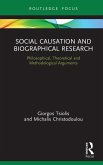George Henry Lewes
A Biographical History of Philosophy (Barnes & Noble Digital Library) (eBook, ePUB)
From Thales to Comte
1,99 €
1,99 €
inkl. MwSt.
Sofort per Download lieferbar

1 °P sammeln
1,99 €
Als Download kaufen

1,99 €
inkl. MwSt.
Sofort per Download lieferbar

1 °P sammeln
Jetzt verschenken
Alle Infos zum eBook verschenken
1,99 €
inkl. MwSt.
Sofort per Download lieferbar
Alle Infos zum eBook verschenken

1 °P sammeln
George Henry Lewes
A Biographical History of Philosophy (Barnes & Noble Digital Library) (eBook, ePUB)
From Thales to Comte
- Format: ePub
- Merkliste
- Auf die Merkliste
- Bewerten Bewerten
- Teilen
- Produkt teilen
- Produkterinnerung
- Produkterinnerung

Bitte loggen Sie sich zunächst in Ihr Kundenkonto ein oder registrieren Sie sich bei
bücher.de, um das eBook-Abo tolino select nutzen zu können.
Hier können Sie sich einloggen
Hier können Sie sich einloggen
Sie sind bereits eingeloggt. Klicken Sie auf 2. tolino select Abo, um fortzufahren.

Bitte loggen Sie sich zunächst in Ihr Kundenkonto ein oder registrieren Sie sich bei bücher.de, um das eBook-Abo tolino select nutzen zu können.
This 1867 survey of philosophy is enlivened by portraits and discussions of Thales, Pythagoras, Socrates, Plato, Aristotle, and Euclid, through more modern philosophers such as David Hume and Immanuel Kant, ending with Auguste Comte. Sections focus on topics, such as the nature of the universe and the origin of knowledge, and groups, such as the Sophists and the Cynics.
- Geräte: eReader
- mit Kopierschutz
- eBook Hilfe
- Größe: 3.51MB
Andere Kunden interessierten sich auch für
![Super Humans : Inspiring Stories of People Who Led Extraordinary Lives Biography Kids Junior Scholars Edition Children's Biography Books (eBook, ePUB) Super Humans : Inspiring Stories of People Who Led Extraordinary Lives Biography Kids Junior Scholars Edition Children's Biography Books (eBook, ePUB)]() Dissected LivesSuper Humans : Inspiring Stories of People Who Led Extraordinary Lives Biography Kids Junior Scholars Edition Children's Biography Books (eBook, ePUB)3,99 €
Dissected LivesSuper Humans : Inspiring Stories of People Who Led Extraordinary Lives Biography Kids Junior Scholars Edition Children's Biography Books (eBook, ePUB)3,99 €![The Meditations (eBook, ePUB) The Meditations (eBook, ePUB)]() Marcus AureliusThe Meditations (eBook, ePUB)0,99 €
Marcus AureliusThe Meditations (eBook, ePUB)0,99 €![How to Think Like a Woman (eBook, ePUB) How to Think Like a Woman (eBook, ePUB)]() Regan PenalunaHow to Think Like a Woman (eBook, ePUB)11,95 €
Regan PenalunaHow to Think Like a Woman (eBook, ePUB)11,95 €![History of Modern Philosophy (eBook, ePUB) History of Modern Philosophy (eBook, ePUB)]() Richard FalckenbergHistory of Modern Philosophy (eBook, ePUB)2,99 €
Richard FalckenbergHistory of Modern Philosophy (eBook, ePUB)2,99 €![Philosophers as Educational Reformers (International Library of the Philosophy of Education Volume 10) (eBook, ePUB) Philosophers as Educational Reformers (International Library of the Philosophy of Education Volume 10) (eBook, ePUB)]() Peter GordonPhilosophers as Educational Reformers (International Library of the Philosophy of Education Volume 10) (eBook, ePUB)181,95 €
Peter GordonPhilosophers as Educational Reformers (International Library of the Philosophy of Education Volume 10) (eBook, ePUB)181,95 €![A Genlis Education and Enlightenment Values (eBook, ePUB) A Genlis Education and Enlightenment Values (eBook, ePUB)]() Denise YimA Genlis Education and Enlightenment Values (eBook, ePUB)40,95 €
Denise YimA Genlis Education and Enlightenment Values (eBook, ePUB)40,95 €![Social Causation and Biographical Research (eBook, ePUB) Social Causation and Biographical Research (eBook, ePUB)]() Giorgos TsiolisSocial Causation and Biographical Research (eBook, ePUB)20,95 €
Giorgos TsiolisSocial Causation and Biographical Research (eBook, ePUB)20,95 €-
-
-
This 1867 survey of philosophy is enlivened by portraits and discussions of Thales, Pythagoras, Socrates, Plato, Aristotle, and Euclid, through more modern philosophers such as David Hume and Immanuel Kant, ending with Auguste Comte. Sections focus on topics, such as the nature of the universe and the origin of knowledge, and groups, such as the Sophists and the Cynics.
Dieser Download kann aus rechtlichen Gründen nur mit Rechnungsadresse in A, D ausgeliefert werden.
Produktdetails
- Produktdetails
- Verlag: Barnes & Noble
- Seitenzahl: 660
- Altersempfehlung: ab 0 Jahre
- Erscheinungstermin: 13. September 2011
- Englisch
- ISBN-13: 9781411458550
- Artikelnr.: 50390560
- Verlag: Barnes & Noble
- Seitenzahl: 660
- Altersempfehlung: ab 0 Jahre
- Erscheinungstermin: 13. September 2011
- Englisch
- ISBN-13: 9781411458550
- Artikelnr.: 50390560
- Herstellerkennzeichnung Die Herstellerinformationen sind derzeit nicht verfügbar.
Introduction
Part I: Preface
Introduction
1. Speculations on the nature of the universe
2. Speculations on the creation of the universe, and on the origins of knowledge
3. Intellectual crisis
4. A new era opened by the invention of a new method
5. Partial adoption of the Socratic Method
6. Complete adoption and application of the Socratic Method
7. Philosophy again reduced to a system
8. Second crisis of Greek philosophy
9. Philosophy allies itself with faith
10. Appendix
Part II: Preface
Introduction
1. Foundation of the inductive method
2. Foundation of the deductive method
3. Philosophy reduced to a question of psychology
4. The subjective nature of knowledge being established leads to idealism
5. The arguments of idealism carried out into scepticism
6. The origin of knowledge reduced to sensation by the confusion of thought with feeling
7. Second crisis - idealism, scepticism, and materialism producing the reaction of common sense
8. Recurrence to the fundamental question respecting the origin of knowledge
9. The demonstration of the subjectivity of knowledge once more leads to idealism
10 Objective idealism
11. The third form of idealism, viz., absolute idealism
12. Final crisis in the history of philosophy, and definite establishment of positivism
Conclusion.
Part I: Preface
Introduction
1. Speculations on the nature of the universe
2. Speculations on the creation of the universe, and on the origins of knowledge
3. Intellectual crisis
4. A new era opened by the invention of a new method
5. Partial adoption of the Socratic Method
6. Complete adoption and application of the Socratic Method
7. Philosophy again reduced to a system
8. Second crisis of Greek philosophy
9. Philosophy allies itself with faith
10. Appendix
Part II: Preface
Introduction
1. Foundation of the inductive method
2. Foundation of the deductive method
3. Philosophy reduced to a question of psychology
4. The subjective nature of knowledge being established leads to idealism
5. The arguments of idealism carried out into scepticism
6. The origin of knowledge reduced to sensation by the confusion of thought with feeling
7. Second crisis - idealism, scepticism, and materialism producing the reaction of common sense
8. Recurrence to the fundamental question respecting the origin of knowledge
9. The demonstration of the subjectivity of knowledge once more leads to idealism
10 Objective idealism
11. The third form of idealism, viz., absolute idealism
12. Final crisis in the history of philosophy, and definite establishment of positivism
Conclusion.
Introduction
Part I: Preface
Introduction
1. Speculations on the nature of the universe
2. Speculations on the creation of the universe, and on the origins of knowledge
3. Intellectual crisis
4. A new era opened by the invention of a new method
5. Partial adoption of the Socratic Method
6. Complete adoption and application of the Socratic Method
7. Philosophy again reduced to a system
8. Second crisis of Greek philosophy
9. Philosophy allies itself with faith
10. Appendix
Part II: Preface
Introduction
1. Foundation of the inductive method
2. Foundation of the deductive method
3. Philosophy reduced to a question of psychology
4. The subjective nature of knowledge being established leads to idealism
5. The arguments of idealism carried out into scepticism
6. The origin of knowledge reduced to sensation by the confusion of thought with feeling
7. Second crisis - idealism, scepticism, and materialism producing the reaction of common sense
8. Recurrence to the fundamental question respecting the origin of knowledge
9. The demonstration of the subjectivity of knowledge once more leads to idealism
10 Objective idealism
11. The third form of idealism, viz., absolute idealism
12. Final crisis in the history of philosophy, and definite establishment of positivism
Conclusion.
Part I: Preface
Introduction
1. Speculations on the nature of the universe
2. Speculations on the creation of the universe, and on the origins of knowledge
3. Intellectual crisis
4. A new era opened by the invention of a new method
5. Partial adoption of the Socratic Method
6. Complete adoption and application of the Socratic Method
7. Philosophy again reduced to a system
8. Second crisis of Greek philosophy
9. Philosophy allies itself with faith
10. Appendix
Part II: Preface
Introduction
1. Foundation of the inductive method
2. Foundation of the deductive method
3. Philosophy reduced to a question of psychology
4. The subjective nature of knowledge being established leads to idealism
5. The arguments of idealism carried out into scepticism
6. The origin of knowledge reduced to sensation by the confusion of thought with feeling
7. Second crisis - idealism, scepticism, and materialism producing the reaction of common sense
8. Recurrence to the fundamental question respecting the origin of knowledge
9. The demonstration of the subjectivity of knowledge once more leads to idealism
10 Objective idealism
11. The third form of idealism, viz., absolute idealism
12. Final crisis in the history of philosophy, and definite establishment of positivism
Conclusion.







